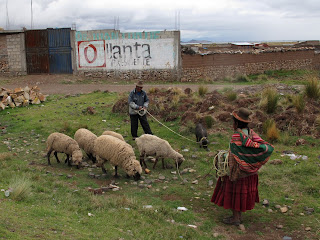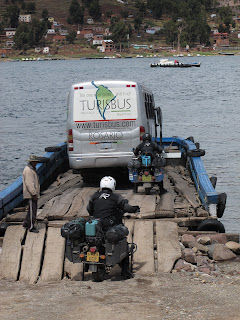Wed 14th December
We left Puno this morning to head for the Bolivian border at Yunguyo and then on to La Paz. After yesterdays somewhat glamorised view of the floating islands and their inhabitants we saw a more natural view of Peruvian rural life as we rode through the plains alongside Lake Titicaca.
Whole families live and work on a patch of land little larger than an allotment. The hut is their home, not the tool shed, although they are probably in there too.
Others survive by raising a few animals and seem to spend all day watching over them.
No large agricultural companies here, or much mechanisation, just hard graft. It's a life of survival much as it was hundreds of years ago but that said, they appear proud and happy enough. The inhabitants probably own their small patch of land and wouldn't give it up whatever they were offered, which is perhaps why the large companies are conspicuous by their absence in this part of the Country
Arriving at the Bolivian border. Another (thankfully) straight forward crossing which we completed in about an hour at no cost. It was interesting that on the Bolivian side there were no computers and the forms for the temporary importation of the bikes were filled out by hand. All four were completed in the time it usually takes to do one on the computer. Then we all knew computers never saved any time or paper didn't we.
Lake Titicaca was far more photogenic and appealing from the Bolivian side, however, we saw little difference in the people, their way of life or the way they dressed.
Parked up for lunch at Copacabana. Someone thought of ordering a cup of coffee but was dissuaded when Bob suggested that we would probably get one on the ferry we had to take to cross the lake in a few minutes.
View of Copacabana and LakeTiticaca from the hills.
Road to the ferry.
'Dos cafe negro and dos cafe con leche por favor'. Our ferry, Sealink it certainly wasn't and no sign of a coffee machine!
Terry and Bob gingerly negotiating the half rotten planks to get on board.
As we approached La Paz, to say that the traffic was chaotic would be a huge understatement. Our progress was reduced to a crawl as we tried to weave our way around literally hundreds of 'collectivos' (minibuses) that were queued up, or just stopped in the middle of the road trying to entice potential passengers. Add the thousands of market stalls along just about every roadside many encroaching well into the road itself and a few million pedestrians milling all over the place and you may begin to get the idea. Welcome to the Delhi of Bolivia.










Stunning!
ReplyDeleteMerry Christmas!!! Eric
ReplyDelete